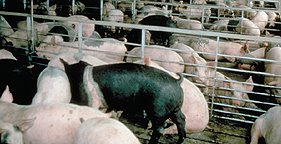
I know I have been blogging a lot about Michael Pollan’s The Omnivore’s Dilemma: A Natural History of Four Meals. But that’s because I was so taken with his book, which opened my eyes to an industrial food complex I never knew existed.
I didn’t expect to learn so much. I live in Berkeley, California and have been buying organic milk for my two daughters for more than a decade (I didn’t want the growth hormones fed to cattle to wrack havoc on their growth) I have a friend who sells me grass-fed beef from cattle raised on her family’s farm. Every time I take a bite of a potato chip I do so in full recognition that the oil used to fry it is rushing straight to my arteries.
What more was there to know? Organic, good, everything else bad. Fresh is better than processed and local is better than imported.
Pollan makes these points and does a masterful job of showing how the American food machine is out of whack, and how its excesses are leading to obesity, diabetes, and early death. He argues vigorously that our desire to have any food in any season at a reasonable price gives us supermarkets stuffed with gorgeous, tempting products – but at a great social and ecological cost. (It takes a lot of fossil fuel to bring those grapes from Chile).
What really stunned me is the great cost to animals to make this happen. Ranchers now stuff their cattle with corn instead of grass because it is cheaper and plumps them up faster. But cows’ digestive systems can’t process the corn so they get sick – even growing a virulent form of e-coli in their stomachs. Ranchers fill the cattle with antibiotics to make them fit for human consumption.
Chickens, even organic “free-range ones” are raised in pens that are so crowded the birds can barely move. To stop them pecking one another, some ranchers routinely cut off their beaks.
Pigs are also raised in conditions that force them to become belligerent. They are taken from their mothers ten days after birth (instead of at weaning at 13 weeks), giving them a lifelong obsession with sucking and chewing. When they are crammed into pens to be fattened for market, they have a tendency to bite off other pigs’ tails To stop this, ranchers snip off the tails – this is called tail docking -- but deliberately leave a sensitive stump. That’s because pigs are highly intelligent and get depressed at their condition, but can be forced out of their depression when their sensitive tails get touched.
Pollan is not an animal rights crusader, and a good part of his book explores the ethics of eating meat. He concludes, in a very interesting fashion, that killing and eating meat is actually a humane act. But his reporting makes the reader ponder the kind of meat she is eating and whether the cruel practices used to get that beef on a barbeque is necessary. As he puts it in the inscription in my book: “Vote with your fork.”
There are many other fascinating issues he raises. I encourage everyone to read the book. If you don’t have the time, remember the mantra, “Eat Local.”
1 comment:
I just read about this in the recent issue of The Sun. This month's interview is the the author.
And I was happy that the brain lives on energy from cabrs and sugar. I always tell people I'm on an all carb diet. And now we know why I'm so smart, don't we? (pfff).
Post a Comment